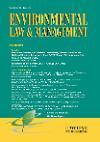ENVIRONMENTAL LAW AND MANAGEMENT - VOLUME 32 - ISSUE 5

Articles
Final authorisations, environmental assessment, compensation and the Habitats Directive. Remarks on Case C–278/21, Aqua Pri, judgment of the CJEU of 10 November 2022
AGUSTÍN GARCÍA-URETA
Professor of Law, University of the Basque Country
The Aqua Pri judgment considered whether the continuation of a previously authorised activity should have been subject to an EIA, since the prior authorisation had only considered the project in isolation, rather than as part of overall activities in the area. In considering questions of administrative law in Member States, the judgment is significant in that it goes beyond the mechanism of appropriate environmental impact assessment of projects having significant effects on Natura 2000 sites.
Reflections on the Spanish Climate Change Law (2021)
MIREN SARASÍBAR IRIARTE
Lecturer in Administrative Law, University of Navarra, Spain
The study offers a critical reflection on some interesting aspects of the new Spanish Law on Climate Change. Without wishing to cast doubts on Spain´s interest in the success of the regulation of this matter, the author considers that it should have been a law with more obligations and more sanctions and, ultimately, have been much more forceful in terms of those measures and commitments related to climate change.
Case Commentaries
High Speed Two (HS2) Limited and the Secretary of State for Transport v Four Categories of Persons Unknown and Ross Monaghan and 58 other Named Defendants
ROSALIND ENGLISH
1 Crown Office Row
In this case, which involved the application, and grant, of an interim injunction in the ‘unknown’ as well as ‘known’ protester context, the claimants had to demonstrate trespass and nuisance, and a real and imminent risk of recurrence. In granting the interim injunction, Knowles J commented that it was of clear geographical and temporal scope and that injunctions against defined groups of persons unknown are now commonplace. The courts have fashioned a body of law in order to address the issues which such injunctions can raise, and to make sure they operate fairly.
River water quality in agricultural areas: R (Sahota) v Herefordshire Council and another
BELLA COUPLAND, JASON LOWTHER AND JO SELLICK
School of Society and Culture, University of Plymouth
The issue at the heart of this judicial review is the maintenance of water quality in agricultural areas and where there is documented stress placed on river systems through nutrient run-off.
Failures in regulating discharges of untreated sewage into rivers: R (Wild Justice) v Water Services Regulation Authority
BELLA COUPLAND, JASON LOWTHER AND JO SELLICK
School of Society and Culture, University of Plymouth
This appeal against the decision not to permit a judicial review concerned a challenge to Ofwat for its alleged shortcomings in regulating sewage discharges. Permission to appeal was refused on the grounds that no arguable case of unlawful action or inaction on the part of Ofwat had been shown.
UK’s Net Zero Strategy fails to satisfy requirements of the Climate Change Act 2008: The Queen (on the application of (1) Friends of the Earth Limited (2) ClientEarth (3) Good Law Project and Joanna Wheatley) v Secretary of State for Business, Energy and Industrial Strategy
SIMON TILLING
Pennon Group Plc, Exeter
In this case three NGOs sought judicial review of the Net Zero Strategy, their principal complaint being that it did not contain the level of detail required by the Climate Change Act to scrutinise whether its proposals and policies were sufficient to achieve the sixth carbon budget (for the years 2033 to 2037). As a result, the High Court ordered the Secretary of State to submit a refreshed report by the end of March 2023.
The UK Sustainability Disclosure Framework: new FCA greenwashing rules under consultation
MUSONDA KAPOTWE, PETER PEARS, OLIVER WILLIAMS, TIM BAINES, SAM EASTWOOD, J PAUL FORRESTER AND LIANG PU
Mayer Brown, London
The FCA’s consultation paper proposes a set of new rules aimed at tackling greenwashing, including investment product sustainability labels and restrictions on how terms like ‘green’ and ‘sustainable’ can be used.
Behind the Headlines
Solar panels on iconic buildings
DAVID POCKLINGTON
Centre for Law and Religion, Cardiff Law School
Landowner sentenced for destruction of River Lugg
DAVID POCKLINGTON
Centre for Law and Religion, Cardiff Law School
